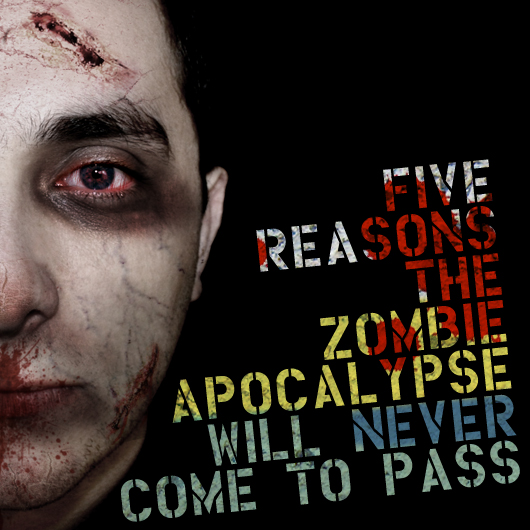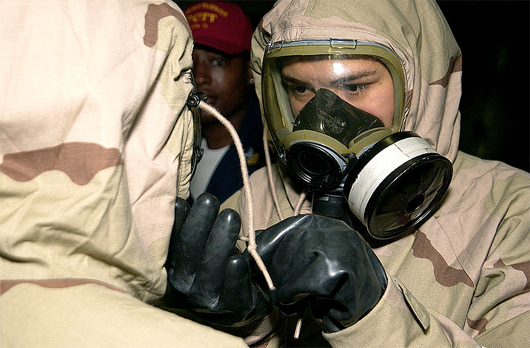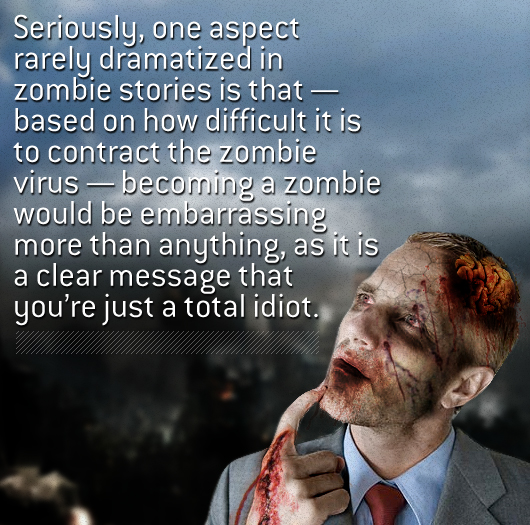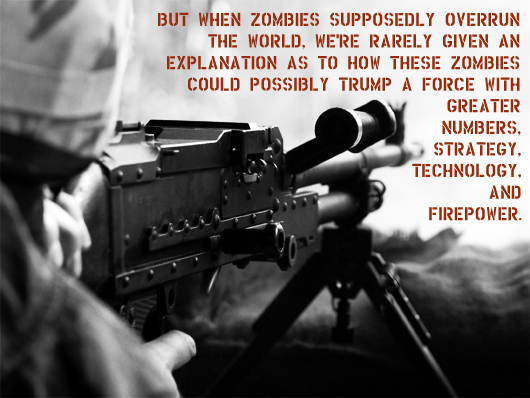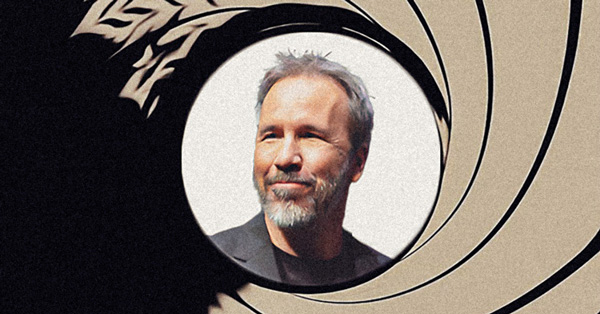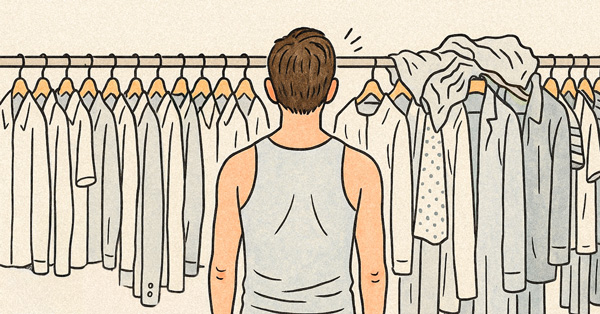Just after watching the pilot episode of The Walking Dead, I decided that while I could still watch (and enjoy) any and all zombie films and television shows… I could no longer truly abide them. There's too many questions logged in my head from years of viewing this particular genre and here, at the end of 2010, I now feel a responsibility to myself and the world to completely unravel any semblance of the well-accepted cultural delusion that zombies could actually take over the world, if they existed in the form presented in popular modern media.
Aside from the fact that no actual virus/infection exists that would turn living people into soulless, plodding flesh-hungry beasts, I believe there are five reasons the zombie apocalypse will never come to pass.
(For the purposes of this dissertation, I am choosing to disregard any zombie tale in which zombies are created by some indefinable Biblical prophecy wherein all dead people rise from the grave and any person who dies after a certain point becomes a zombie whether or not they've been “infected” in any way. Because… come on, that's just ridiculous.)
5. Weather
You know how you have separate clothes for winter and summer? That's because getting extremely hot or cold is bad for the human body (you may have gleaned this, over the years). Extended exposure to harsh summer sun and/or the frigid temperatures that normally accompany snow and ice will absolutely kill fully nourished and healthy humans. So how would people with open wounds, no shelter, and rapidly decaying flesh and bone respond to being out in the sun for hours or days or weeks at a time?
With an intermittent diet consisting only of human/animal flesh, their bodies would quickly become dried out and malnourished, and they would soon turn to sticky puddles of death on a hot stretch of highway. And if any zombies were caught in a frigid climate, their likelihood of survival would be even further reduced. Frostbite on the limited remaining blood and fluid in their bodies would quickly eliminate motor function, reducing them to mildly cool heaps of flesh itching to be plowed into snowdrifts.
4. They're already dead
Humans may be relatively fragile but at least we can fix ourselves, more often than not. Human beings can get stabbed, shot, hit by cars, dropped from great heights, drowned, and poisoned and STILL SURVIVE (though to be honest, I don't know if anyone's sustained all of those in quick succession). We have science, medicine, and — above all — functioning immune systems. Zombies would have none of these. In addition to the aforementioned problems that zombies would encounter via the elements, they have no way to solve any other physical problem that may pop up. Oh, a zombie stepped off a curb at an awkward angle and broke his/her ankle? Have fun on the asphalt. A stray dog attacks them? Done.
Anything that happens to a zombie is final. Their life support is largely already unplugged. They cannot patch themselves up or seek help at a zombie hospital and their body can't do anything on its own. The hard work in killing them is done. There's no right or wrong way to go about ending a zombie's tenure. It's one move based purely on physics: impale the brain and walk away.
3. Disease control
Remember when everyone freaked out about SARS? How about the big Bird Flu scare, at the beginning of this century? And then the big Swine Flu business last year — remember that? The total combined deaths of those three recent outbreaks worldwide was under 20,000 people (and an overwhelming majority of those were from swine flu, which is odd considering that that form of influenza is not usually very deadly). Even with a decade and three different battlefronts, the result was far from global eradication of our species. Further, do you know how many SARS/Bird Flu/Swine Flu deaths happened in the United States? About 3,400, and those were ALL Swine Flu related (and nearly half of them were in Florida, Texas, New York, and California… meaning quarantine would've been relatively easy to implement).
Now you may be saying: “well, the death toll in those three instances was small because SARS and the flu are treatable and thus, not 100% lethal. So, the number of people who were infected with SARS/the flu is a lot higher than the number of people died by them. But with the zombie infection, once you're infected, survival is not possible.” And you'd be right. If the zombie virus spread like the Swine Flu, over 600,000 people would be zombies. Or would they? No, they wouldn't.
See, there is one HUGE difference between something like swine flu and the zombie virus beyond existing suitable medical treatment: transmission. The reason that influenza (in all its forms) has hung around so long and killed so many (thousands of people per year in the U.S. alone) is because it is very contagious. Whether it's through direct contact with fluids, aerosol germs, or touching a contaminated surface, if you believe someone around you has the flu, you basically need to avoid everyone and everything. Once the flu's in the area, it's very difficult to remain flu-free.
But one unchanging part in nearly all of the zombie mythos is thus: you can only become a zombie if you are bitten by a zombie. So to avoid becoming infected with the zombie virus… all you need to do is not get bitten. How hard could that be? Well, for real-world comparison, how many times have you contracted rabies? Exactly. On average, less than 3 people die of rabies in the U.S. annually. The lack of rabies-related death can be attributed to effective vaccinations but also because, at this point, people know not to get within biting distance of wild animals. So, if you knew a zombie virus was out there, would you get within biting distance of any person you didn't know to be zombie-free (to say nothing of getting within biting distance of any person who looked like a zombie)? Wouldn't you wear long sleeves and pants and denim and leather all the time just to ensure no zombie could even accidentally pierce your skin? Seriously, one aspect rarely dramatized in zombie stories is that — based on how difficult it is to contract the zombie virus — becoming a zombie would be embarrassing more than anything, as it is a clear message that you're just a total idiot.
Anyway, my point is this: we don't live in 14th-century Europe. Zombification isn't the Black Death. And even if the zombie virus was transmitted by rats or fleas like Black Death… again, it's not the 14th century anymore. When a disease (of any kind) threatens us in the year 2010, we immediately hear about it. A video of zombies would be on TwitVid within an hour of being filmed. We learn about it. We can handle it. We close borders and set up mobile clinics. We may not solve it immediately but you know those two places, the Center for Disease Control and Prevention and the World Health Organization? They're more than a couple of offices with fluorescent lights and file cabinets. They figure out how diseases work. And even if it took a month or a year or even ten years to figure out how to treat the infected, these national/global groups would have no qualms about running PSAs every 19 seconds proclaiming “hey, just a reminder: don't let dead people bite you!”.
2. They're mindless
Whether you believe they can run or not, one inescapable truth about zombies since their introduction to pop culture has been that they are conclusively no longer human. They can't speak. They can't avoid danger. They can't use tools. They can't hide and wait until your back is turned. They can't organize and design an effective plan of attack. They can't conserve their energy. They can't defend themselves. Translation? Make sure there are none hiding in your house and then just shut your doors and windows. That's literally all you ever need to do.
Zombies could pile up against the sort of door used as the main entry in a home or building but it probably wouldn't do much good as those doors are designed to keep people out. Zombies have no muscular strength or logic to organize “1… 2… 3… push!” so it would be long, sustained light pressure on your front door. I think by the time that loosely assembled plan came together for the zombies (if it ever did), you would've had more than enough opportunity to slip out the back door and drive anywhere else in the country.
Put it this way: how many able-minded criminals have broken into your residence when the doors were locked? Take it back another step: how many ANIMALS have outsmarted you enough to enter your house? And zombies are conclusively dumber and less capable than both of those groups. Our whole world is already full of objects erected to keep things apart — anybody who didn't have brainpower or muscular ability enough to use a sledgehammer or turn a door knob would have endless amounts of trouble breaching these barriers. And that's before you factor in people nailing two-by-fours across every entrance, piling up sandbags along the sidewalk, and buying tank spikes from the Army surplus store (I already have a line of credit there, just in case).
If you're going to take over the world, you need to at least be as smart as my dog. Zombies don't make that cut.
1. The military.
I would argue that no genre has disrespected the military quite like zombie cinema. At least when aliens or monsters or robots devastate armed forces in movies, it is usually hilariously explained within the context of the story (aliens have technology, monsters are bulletproof and very large, robots take over our computers and become omnipresent). But when zombies supposedly overrun the world, we're rarely given an explanation as to how these zombies could possibly trump a force with greater numbers, strategy, technology, and firepower. Zombie fiction (in film and literature alike) tells us that these military forces were simply defeated and that's about it. We'll see the occasional abandoned tank and helicopter, with bloody fatigued bodies nearby but we're never really offered any reasonable logic as to how this could have happened. That's because it wouldn't happen. It's dumb.
[Even worse, most zombie media will usually add another insult to the military by depicting at least one or two sequences wherein our protagonist ragtag band of survivors (or even a single survivor) — traditionally armed only with melee weapons — successfully wipe out a dozen or so zombies while rarely enduring any casualties on their side. How does this make any sense? A bunch of untrained civilians can hold this menace at bay but no military can? Pssh. Anyway, back to my point.]
Using America's military for comparison, do you realize that even when facing multiple well-armed foreign militaries overseas nearly non-stop over the last 90 years, the entire American military has never even come close to being totally annihilated (also relevant: America won nearly all of those wars). And those were multiple-year struggles against organized groups with rifles and jets and tanks — not a bunch of uncoordinated, slow-moving morons in wide open spaces.
On top of that, one of the biggest issues in winning a war is finding and subsequently neutralizing the opponent. This would never ever be a problem with zombies because zombies would be the only opponent in the history of living things to:
a. repeatedly try to get very close to their greatest predator
b. have absolutely no defense against their greatest predator
c. not flee their greatest predator even as their greatest predator is obliterating all other zombies
d. not be able to increase their numbers without step A
So if this unlikely outbreak somehow started, as long as every healthy human being stayed indoors, all the military would need to do is drive down the street and capture/kill those stumbling around, looking for flesh. It would be easier than Duck Hunt.
In conclusion, the zombie-induced end of the world as depicted in films, television shows, and comic books would never happen. Could zombies wreak some havoc in a small, isolated town full of the dumbest people on Earth? Sure. But once anyone with a functioning brain heard about it, the clean-up would take like 9 hours.



